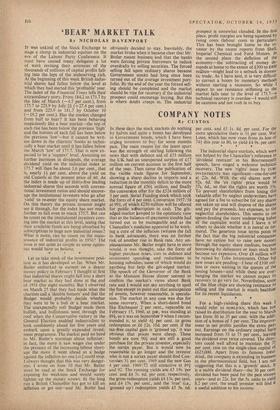COMPANY NOTES
By CUSTOS IN these days the stock markets do nothing by halves and quite a boom has 'developed in Government bonds, which I have been urging investors to buy for some months past. The main reason for the latest spurt was the strength of sterling following the news that with defence aid of £33 million the UK had an unexpected surplus of £17 million on current account in the first half of the year. Then came the publication of the visible trade figures for September, showing a sharp decline in imports and a reduction ,in the monthly deficit to the more normal figure of £501 million, and finally the converstion offer for the £524 million of
3 per cent. Serial Funding stock which took the form of 4 per cent. Conversion 1957/58 at 991, of which £250 million will be offered for public subscription in cash. The gilt- edged market jumped to the optimistic view that as the balance-of-payments trouble had turned out to 'be manageable and as the Chancellor's medicine appeared to be work- ing a cure of the inflation (witness the fall in bank advances), there was no further risk of another rise ] in Bank rate. Any un- pleasantness Mr. Butler might have in store would, it was thought, take the form of higher purchase taxes, cuts in defence and investment spending and reductions in housing subsidies, none of which would do anything but help the gilt-edged market. The speech of the Governor of the Bank at the Mansion House dinner seemed to confirm the market's views about Bank rate and I would not say anything to spoil the fun except to point put that anticipation of events, however reasonable, is specula- tion. The market in any case was due for some recovery. When a. short-dated bond like Exchequer 2 per cent., repayable on February 15, 1960, at par, was standing at 89f, as it was on September 9 when I recom- mended it, to yield 4+ per cent. to gross redemption or, £6 12s. 10d. per cent. if the tax-free capital gain is 'grossed up,' it was obvious that prices were cheap. These bonds are now 90+ and are still a good purchase for the private investor, especially the surtax payer. But it would now be reasonable to go longer and the investor who is not a surtax payer should find Con- version 31 per cent. 1969 and the new Gas 4 per cent. 1969/72 still attractive at 894 and 92. The running yields are £3 19s. per cent. and £4 7s. 6d. per cent. respectively, the gross redemption yields £4 13s. per cent. and £4 15s. per cent., and the 'true' (i.e., 'grossed up') redemption yields £5 5s. 6d.
per cent. and £5 Is. 8d. per cent. For the more speculative there is 34 per cent. Win Loan, which has now risen from its low of 744 this year to 80, to yield £4 9s. per cent
* • * The industrial share markets, which were not helped by the Chancellor's reference to 'dividend restraint' in his Bournemouth speech, have staged a welcome technics] recovery. The new 'rights' issue by TUBE INVESTMENTS was significant-one-for-one at 22s. 6d. With the old shares now al 92s. 6d. the 'ex rights' price would be 57s. 6d., so that the rights are worth 35 To prevent shareholders from losing this valuable offer by neglect underwriters have agreed for a fee to subscribe fo-r any shares not taken up and will dispose of the shares and pay the proceeds, less expenses, to the neglectful shareholders. This seems to me spoon-feeding the more undeserving babes of the capitalist world and I leave it to others to decide whether it is moral or its- moral. The generous issue terms point to the fact that the big industrial companies have no option but to raise new money through the equity share medium, because borrowing by debenture or loan stock has become too expensive. Over £8 million w1,11 be raised by Tube Investments. Other big new issues are pending-I hear of £100 mil. lion or more waiting in the queues of the issuing houses-and while these are over- hanging the market we cannot expect its recovery to go very far. Nevertheless, some of the blue chips are showing resistance to selling and the market is much healthier for its recent liquidation.
For a high-yielding share this week I would refer to HORLICKS, which has just raised its distribution for the year to March last from 30 to 35 per cent. with the addi- tion of a bonus of 5 per cent. The improve' ment in net profits justifies the extra paY' out. Earnings on the ordinary capital have increased from 53 to 75 per cent., leaving the dividend over twice covered. The direc- tors could well afford to maintain the 35„ per cent. rate on the single-class capital 01 £625,000. Apart from its famous food- drink, the company is extending its business in the pharmaceutical field, but I am not suggesting that this is a 'growth' stock. Jt is a stable dividend share-the 30 per cent, dividend has been paid for the past sixteen years-and at 22s. for the 5s. units to yield 8.2 per cent. the small investor will find it a useful addition to his income.










































 Previous page
Previous page